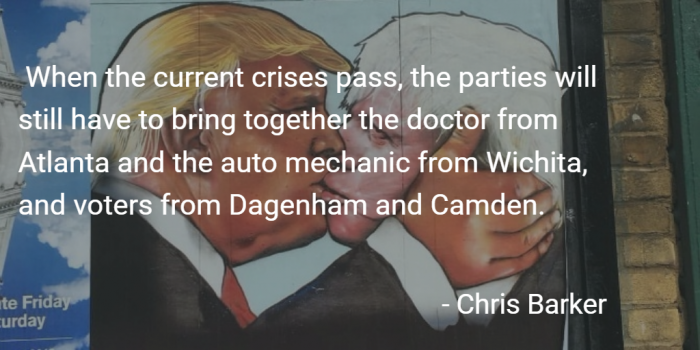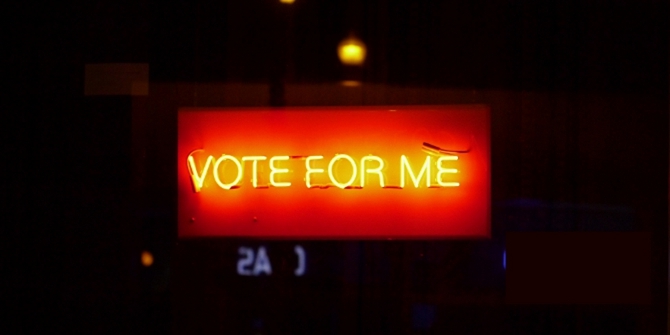 The UK’s recent vote to leave the European Union has been seen by many commentators as mirroring the rise in popularity of Donald Trump on the other side of the Atlantic. Chris Barker writes that the popularity of Trump and Brexit can be traced at least in part to a growing divide between the metropolitan upper classes and non-privileged households in both the US and the UK. He also argues that both the UK Labour and Conservative parties and the Republican Party in the US were unable to “create” political opinions that were against Brexit and Trump, meaning that they are now very much on the back foot.
The UK’s recent vote to leave the European Union has been seen by many commentators as mirroring the rise in popularity of Donald Trump on the other side of the Atlantic. Chris Barker writes that the popularity of Trump and Brexit can be traced at least in part to a growing divide between the metropolitan upper classes and non-privileged households in both the US and the UK. He also argues that both the UK Labour and Conservative parties and the Republican Party in the US were unable to “create” political opinions that were against Brexit and Trump, meaning that they are now very much on the back foot.
Arguably, academics haven’t been too helpful in predicting the rise of Trump in the US, or the UK’s move towards exiting the EU. However, we are effective at retrospection. The Chronicle of Higher Education has recently published a very useful, if controversial, reading list for the 2016 Presidential Election. Some of those books should also be on the syllabi of the British political theorists who are seeking explanations for the Leave vote’s victory.
Of them, perhaps the most illustrative of what has happened thus far in the Brexit debate is Charles Murray’s two cultures argument, Coming Apart. It describes a new American upper class whose politics, education, bi-coastal geography, and everyday lifestyle fails to connect to a new lower class of the American interior, less-than-graduate education, and low-wage jobs. Although by no means an explanation of the Leave vote, it helps to explain the growing gap in perception and lifestyles that separates Sunderland from London, and London’s Barking and Dagenham from the strongholds of Remain, such as Camden.
The best part of Murray’s book is a short quiz that usefully defines the gap between cultures in terms of everyday lifestyle questions. “Have you ever walked on a factory floor?” and “What does the word ‘Branson’ mean to you?” may mean just as much as age and household income when describing Britain’s two cultures. It was remarked by lawyer Jon Holbrook at a recent town hall in Islington that Europe has no shared conversation. For Eurosceptics, the EU is a construct of Brussels lacking markers of common citizenship. Be that as it may, the Brexit vote strongly suggests that the conversation between privileged and non-privileged white households in the UK has broken down.
A second book that has garnered much critical notice during the 2016 US presidential primary is The Party Decides, an influential 2008 work that uses a quarter-century of data to argue that candidate choice is ultimately dictated by party elites in an “invisible primary.” The authors measure the invisible primary in the form of the number of endorsements, from a wide variety of “intense policy demanders,” that a candidate receives even before the people formally speak through the Iowa caucuses. One of the authors, Marty Cohen, admits that the study did not predict Trump’s nomination. However, some critics try to save the emphasis on party by defining it widely (as does The Party Decides). Within this group, Conor Friedersdorf examines the cues sent by the party (the “how” question), rather than who “the party” is, to suggest that the party’s cues have promoted vigilance and even insurgency.
Although a referendum is a very different process than choosing between candidates in a general election, the correct conclusion to draw on the party’s role in choosing Brexit is that Labour, for example, did not fail to send cues to their supporters or to induce them to turn out for the vote. Instead, many of the cues justified a protest vote against a system of perceived privilege and exclusion. However, it does not make too much sense to define the party as broadly as The Party Decides envisions, because at some point one loses the distinction between party leadership and the distributed opinions of voters, however loosely affiliated. The interesting question is whether any of these distributed voices can “create” political interests and opinions, and thus a party ideology and discipline, as Harvard University’s Nancy Rosenblum argues that parties traditionally do. What Rosenblum writes in defense of the “ethics of partisanship” is certainly relevant in the midst of Brexit-Gove upheavals (“elections are not followed by waves of suicide”), but when the current crises pass, the parties will still have to bring together the doctor from Atlanta and the auto mechanic from Wichita, and the aforementioned voters from Dagenham and Camden.
Let us suppose that the fault lies with the traditional parties. At a Mile End Institute academic post-mortem on the morning of the 24th, Labour’s “fabled” ground game was blamed for failing to convince those North of the M4 to Remain. Some blamed Labour leader Jeremy Corbyn for his quietly Eurosceptic lack of leadership, although other voices on the panel lauded his Labour authenticity while complaining about his stiltedness and inability to form a broader Labour coalition. Cameron’s Tories were blamed for transforming an intra-party squabble into an existential moment for the country. The Liberal Democrats were blamed for irrelevance, and there was doubt as to whether UKIP will exist now that its “issue space” has closed.

Nigel Farage’s post-2015 strategy to target Labour voters in the north and Midlands has been vindicated. However, academics who have predicted that the Conservative party will quickly snap back to party unity and continued electoral success may be wrong. The leadership is in turmoil, and Boris Johnson is reaping the personal rewards of high-variance politics. On June 24th, after the Leave vote, Tim Bale predicted a general election by May 2017 followed by another Conservative majority. In May, Bale also wrote that Conservative remainers, in the event of a Leave vote, would “be supported, rather than summarily executed, by the majority of those in the victorious Leave camp.” In the event, it is those in the Leave camp who have been busy undermining one another. Predictions of electoral success must hinge on whether voters view these Machiavellian machinations as good politics or as the self-interested jockeying of elites. Thus far, both Conservative MPs and voters appear to be angered by Johnson’s volte-face.
If the party does not decide, then how can the decision be the party’s fault? Well, it may be said, it is the party’s fault that it didn’t decide. This rings true in America, where Trump excelled because of the complete inability of Reince Priebus et al to impose party discipline in the remarkably broad 16-person Republican field. In other years, Ohio Governor John Kasich or probably former Florida Governor, Jeb Bush would have dropped out of the race early, leading to the transfer of their wealth of supporters and donors to Senators Marco Rubio or Ted Cruz. In the volatile 2016 US election cycle, party leaders could not even constrain the range of candidates from which voters were able to choose. These criticisms also resonate in the UK, where the resignations from Corbyn’s shadow cabinet, David Cameron’s swiftly announced resignation, and Michael Gove’s palace coup show that the parties’ leaders are absorbing the damage of the surprise victory of Leave.
In any event, Cameron’s resignation speech the morning after the vote recognized the “will of the British people” as “an instruction that must be delivered.” To borrow a phrase from a Labour Leave voter from a recent town hall: let the plebs decide. But it is undesirable and simply inconsistent with the existing system of representative government to argue that voters, by supporting Leave, created a new political condition divorced from the influence and input of parties and of specific leaders. Although the party didn’t decide the EU referendum, neither did “we the people.” Referenda are two-stage processes: the people choose change, but they do not enact the change. Almost all the entire value or the negatives of Brexit lie ahead rather than behind the UK, in the “all-consuming task” of negotiating withdrawal and Brexit. The UK will be saved or ruined by the parties, their leaders, and the specific policies and international agreements that they negotiate. Hopefully, once they have settled their leadership quarrels, the parties can return to the dignified work of clarifying difficult ideas and organizing opposition.
Featured image credit: Chris Herbert (Flickr, CC-BY-NC-SA-2.0)
Please read our comments policy before commenting.
Note: This article gives the views of the author, and not the position of USApp– American Politics and Policy, nor of the London School of Economics.
Shortened URL for this post: http://bit.ly/29aPiAu
______________________
 Chris Barker – Southwestern College
Chris Barker – Southwestern College
Chris Barker is an Assistant Professor of Political Science at Southwestern College where he teaches political thought. He has previously held positions at Ohio University, Boston College, and Harvard University. He recently completed his first book manuscript on John Stuart Mill’s liberalism. His most recent articles have appeared or are forthcoming in Contemporary Political Theory; History of European Ideas; American Political Thought; and Law, Culture and the Humanities.






